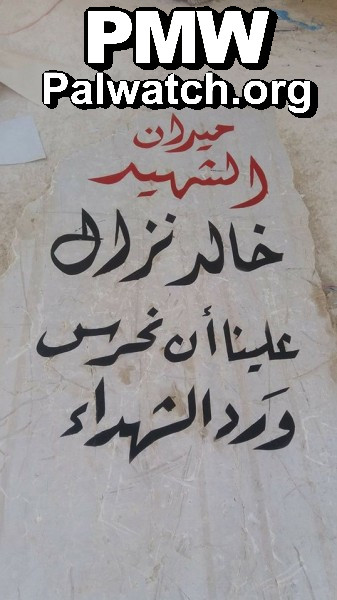DFLP reinstates destroyed monument to terrorist in Jenin

Headline: “The Democratic Front in Jenin re-erected the monument in memory of Martyr Khaled Nazzal”
“In the presence of several leadership members from the Democratic Front [for the Liberation of Palestine] and national activity institutions and factions, the monument in memory of Martyr (Shahid) Khaled Nazzal (i.e., terrorist, responsible for murder of 31) was returned to its place in the center of Jenin today [July 1, 2017].
The Front said in a statement that it published: ‘The return of the monument to its place is a response to the occupation’s policy and a sign of loyalty to Martyr Khaled and all of Palestine’s Martyrs. This is after the cruel attack that the occupation forces committed in removing the monument several days ago so as to violate the [Palestinian] national memory, and in an attempt to harm our Martyrs in a way that is consistent with [the occupation’s] plans and the strengthening of them.’
The Democratic Front saluted all members of our people throughout the homeland and the lands of the diaspora, and the residents of Jenin in particular, for their heroic stand against the occupation’s policy and for the return of the monument to its place. The Front emphasized that Khaled Nazzal will continue to live forever in the heart of his people, his comrades, and all of the fighters for Palestine’s freedom and independence. The Front also warned against any official Palestinian collaboration with the occupation to damage the status of the Martyrs, and said that compliance with and submitting to these dictates will whet their [Israel’s] appetite to target all symbols of our national movement and its history, which was paved with the blood of the Martyrs.”
The article includes an image of the new monument.
Text on monument: “Martyr Khaled Nazzal Square
We must guard the flowers of the Martyrs (quote from poem by Palestinian poet Mahmoud Darwish –Ed.)”
Khaled Nazzal
Mahmoud Darwish